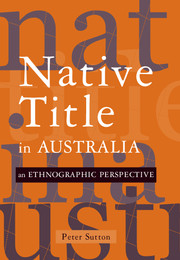Book contents
- Frontmatter
- Contents
- List of Figures
- Acknowledgements
- Introduction
- Map
- Chapter 1 Kinds of Rights in Country
- Chapter 2 Local Organisation Before the Land Claims Era
- Chapter 3 Aboriginal Country Groups
- Chapter 4 Atomism versus Collectivism
- Chapter 5 Underlying and Proximate Customary Titles
- Chapter 6 The System Question
- Chapter 7 Kinship, Filiation and Aboriginal Land Tenure
- Chapter 8 Families of Polity
- Notes
- References
- Index
Chapter 6 - The System Question
Published online by Cambridge University Press: 22 September 2009
- Frontmatter
- Contents
- List of Figures
- Acknowledgements
- Introduction
- Map
- Chapter 1 Kinds of Rights in Country
- Chapter 2 Local Organisation Before the Land Claims Era
- Chapter 3 Aboriginal Country Groups
- Chapter 4 Atomism versus Collectivism
- Chapter 5 Underlying and Proximate Customary Titles
- Chapter 6 The System Question
- Chapter 7 Kinship, Filiation and Aboriginal Land Tenure
- Chapter 8 Families of Polity
- Notes
- References
- Index
Summary
INTRODUCTION
In their reasons for judgement in 2002 in the Yorta Yorta appeal, three justices of the High Court of Australia expounded their decision on one of the more difficult issues in the native title regime. This was the question of whether current native title claimants may be found to be acknowledging traditional laws and acknowledging traditional customs even if those laws and customs have changed or diminished substantially, or there have been breaks in the transmission of those traditions, since the time when British sovereignty was established over the area in question.
They said in part:
[I]t is important to bear steadily in mind that the rights and interests which are said now to be possessed must nonetheless be rights and interests possessed under the traditional laws acknowledged and the traditional customs observed by the peoples in question. … For the reasons given earlier, ‘traditional’ in this context must be understood to refer to the body of law and customs acknowledged and observed by the ancestors of the claimants at the time of sovereignty.
For exactly the same reasons, acknowledgment and observance of those laws and customs must have continued substantially uninterrupted since sovereignty. Were that not so, the laws and customs acknowledged and observed now could not properly be described as the traditional laws and customs of the peoples concerned. […]
- Type
- Chapter
- Information
- Native Title in AustraliaAn Ethnographic Perspective, pp. 135 - 172Publisher: Cambridge University PressPrint publication year: 2003

